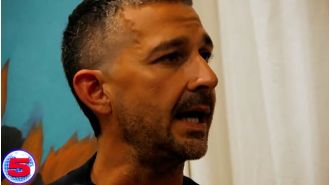Eating disorder hindered my identity as a trans woman.
I used my body to express the pain in my mind.

As I sat down to eat, I could feel the weight of my expectations and insecurities pressing down on me like a heavy coat. But as I took a bite of my meal, I felt a sense of relief wash over me. For a brief moment, I was able to forget about the burden of my own self-image and just enjoy the simple pleasure of nourishing my body.
But as I walked through the bustling streets of Riga, I couldn't help but feel out of place. Everyone around me seemed so put-together, while I felt like an imposter in my leopard print coat and red lipstick. I was in a foreign country, alone and acutely aware of my identity as a boy wearing makeup.
To make matters worse, my body was rebelling against me. After months of restricting my food intake, I found myself feeling sick whenever I tried to eat something. It was as if my body was punishing me for trying to nourish it. I remember having a breakdown in a Latvian supermarket, desperately searching for Weetabix - one of the few foods I felt comfortable eating at the time. It was then that I realized something needed to change.
As a trans woman, I had always felt different growing up. I dropped hints and left clues, hoping someone would see the girl inside me and accept me for who I truly was. But gender dysphoria is hard to explain to someone who has never experienced it. It's like playing a video game with the wrong controller - it's difficult to make connections and feel like you truly belong.
My teenage years were a tale of two halves. The first was marked by rebellion and mischief, while the second was defined by a sense of isolation. I did well in school, but I struggled to make meaningful connections with others. I couldn't be truly open with myself, so how could I be close to anyone else?
After graduating, I started working night shifts at a backpacker's hostel. My life was turned upside down - my days were nights and my nights were days. It was during this time that my relationship with food began to change. What was once a source of comfort and joy became an all-consuming obsession. I would spend my nights watching food shows and calculating calories, imagining the taste of meals I would never allow myself to eat.
It's not uncommon for trans individuals to develop eating disorders. In fact, studies have shown that the rates of eating disorders are much higher among trans individuals compared to the national average. I can't pinpoint exactly when anorexia became a problem for me, but I know that I felt a strange sense of pride in my ability to restrict food. It was a way for me to reflect the turmoil in my mind by making my body mirror my mental state.
But nobody can force you to recover from an eating disorder. It's something that you have to come to terms with and actively work towards. After months of restricting my food intake, people started to notice and compliment me on my weight loss. It felt like an achievement, like I had won something. But deep down, I knew that it was a dangerous and unhealthy way to live.
As I continue on my journey towards recovery, I am learning to be kinder to myself and my body. I am learning to embrace my true identity and not let societal expectations define who I am. It's a challenging road, but I know that I am not alone. If you or someone you know is struggling with an eating disorder, please reach out for help. Recovery is possible and everyone deserves to nourish their body and mind.
As I took a bite of the carefully selected Weetabix, I couldn't help but feel relieved. For a brief moment, the person I wanted to be was no longer clouded by the chaos in my mind. But as I walked through the brisk January wind in my leopard print coat and red lipstick, I felt completely out of place amongst the immaculately groomed individuals of Riga, Latvia. This was a planned stop on my gap year before university, but I suddenly became painfully aware that I was a boy in make-up, alone in a country not known for its tolerance of LGBT+ people.
Not only was I struggling with my identity, but my body was also in a state of revolt. After months of severely limiting my food intake, I found myself feeling sick when I tried to eat and even sicker if I didn't eat at all. It all came to a head in a Latvian supermarket, as I frantically searched for the one food I felt comfortable eating at the time - Weetabix. That was the moment I knew I couldn't continue living like this.
Growing up, I always felt different, like I was constantly leaving hints and clues about the girl inside, hoping someone would put them all together and confront me with my true nature. But as I came to understand, gender dysphoria is hard to describe to someone who hasn't experienced it. It's like trying to play a video game with the wrong controller - making real, substantial connections becomes difficult.
If I couldn't be true to myself, how could I ever be close to someone else? My teen years were a tale of two halves - the first characterized by my mischievous behavior and the second marked by a quiet sense of isolation. I excelled in my studies, but had very few friendships. I felt like I was constantly living in secrecy, unable to truly be open with myself and others.
After school, I started working nightshifts in a backpacker's hostel, which turned my life upside down. My days became nights, and nights became my days. It was during this time that I became rigid about what I ate. Before then, food had always been a positive and comforting part of my life, with fond memories of fish suppers, hot chocolate, and freshly baked bread. But as I worked in the silence of the hostel at night, I found myself watching food shows and obsessing over menus and calorie counts.
This obsession with food became all-consuming, like a first love or crush. And I soon learned that I wasn't alone in this struggle - studies show that a high percentage of trans individuals suffer from eating disorders. I couldn't pinpoint exactly when my anorexia started, or why it attached itself to me. But I know that at the time, I wanted it. I took pride in my ability to restrict food and admired the way my sickly thin body mirrored the turmoil in my mind.
But as I continued on this destructive path, people started to notice. Family members I hadn't seen in a while commented on my weight loss, and I couldn't help but feel a sense of achievement. It was like I had won something. However, I knew deep down that this was not a healthy way to live.
If you or someone you know is struggling with an eating disorder, don't hesitate to reach out for help. Recovery is a difficult journey, and no one can force you to take the first step. But remember, you are not alone, and there is support available to help you on your path to healing.










